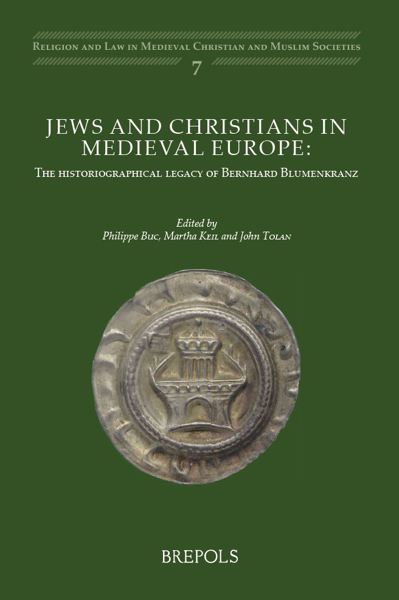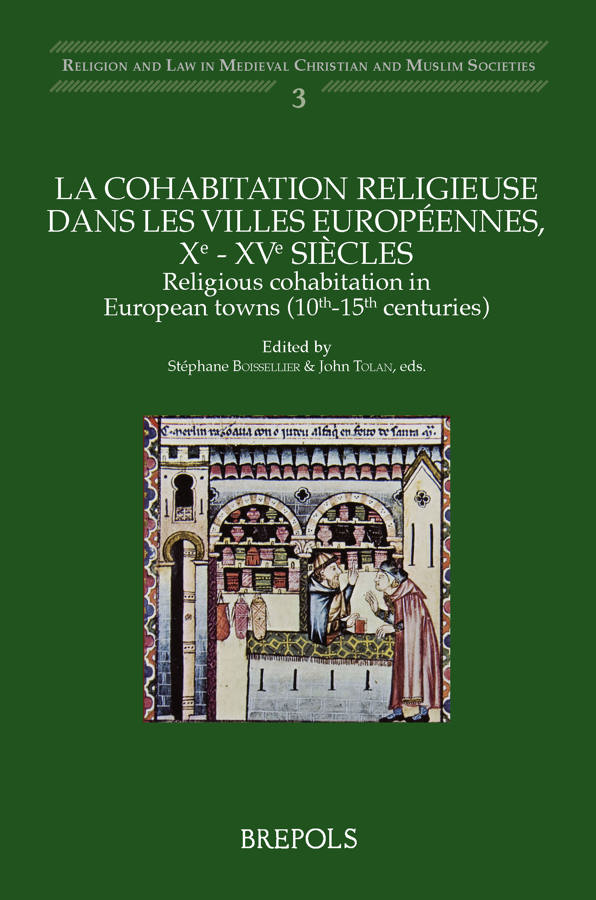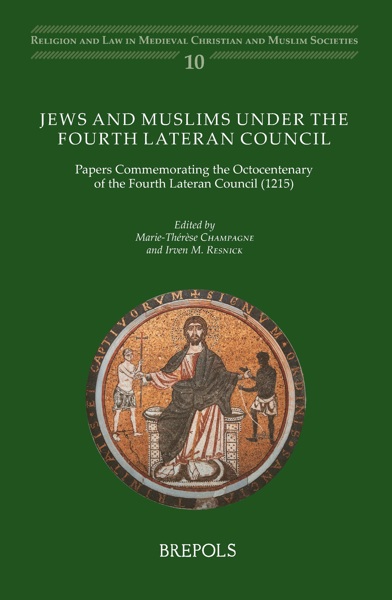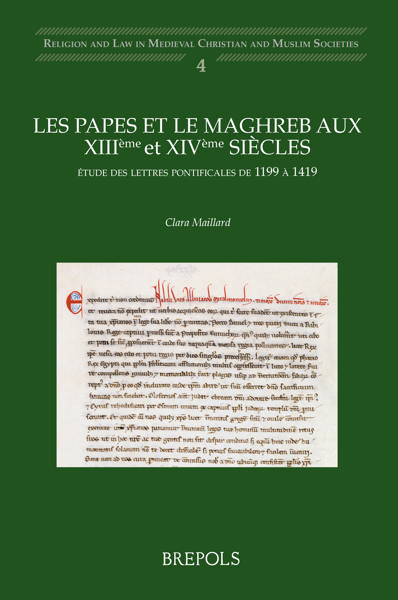
La cohabitation religieuse dans les villes Européennes, Xe - XVe siècles. Religious cohabitation in European towns (10th-15th centuries)
John V. Tolan, Stéphane Boissellier (eds)
- Pages: 326 p.
- Size:156 x 234 mm
- Illustrations:3 b/w
- Language(s):French, English, Spanish
- Publication Year:2015
- € 90,00 EXCL. VAT RETAIL PRICE
- ISBN: 978-2-503-55252-1
- Paperback
- Available
- € 90,00 EXCL. VAT RETAIL PRICE
- ISBN: 978-2-503-55287-3
- E-book
- Available
"(...) c’est avec plaisir qu’on découvre cet ouvrage très documenté et fort éclairant sur les rapports sociaux, la fabrique des identités, les coutumes cautionnées ou interdites, pour le pouvoir dominant aussi bien que pour les minorités religieuses, dans les espaces de contacts multiconfessionnels que sont les villes médiévales." (Carine Giovénal, dans: Perspectives médiévales, 36, 2015, http://peme.revues.org/8919)
"Alles in allem haben die beiden Herausgeber ein sehr interessantes, informatives und lesenswertes Buch zu einem wichtigen Thema vorgelegt." (Gisela Naegle Gießen, in Francia-Recensio 2015/4
Mittelalter - Moyen Âge (500-1500); http://www.perspectivia.net/publikationen/francia/francia-recensio/2015-4/ma/boissellier_naegle)
« La cohabitation religieuse dans les villes européennes comprend des contributions assurément de valeur. » (Hugues Didier, dans Revue d’historie ecclésiastique, 112/1-2, 2017, p. 310)
"(...) einen Band, dessen Wert in der Aufarbeitung vieler einzelner, interessanter, aber disparater Spezialfälle und -aspekte besteht, der aber auch andeuten mag, welche Diskrepanz nicht nur zwischen Rechtsnorm und Praxis, sondern auch zwischen "Normvorstellungen" und Praxis bestanden hat." (Hans-Werner Goetz, in: sehepunkte 17 (2017), Nr. 9 [15.09.2017], URL: http://www.sehepunkte.de/2017/09/26921.html)
John Tolan is professor of Medieval History at the University of Nantes and author of numerous articles and books in medieval history and cultural studies. He currently is director of a major project funded by the European Research Council, “RELMIN: The legal status of religious minorities in the Euro-Mediterranean world (5th-15th centuries)” (www.relmin.eu).
Stéphane Boissellier is full professor of medieval history at the University of Poitiers (France) ; author of books and articles about medieval social and economic history. He leads a scientific program ("Espagne-Méditerranée : Normativité et territorialité des faits sociaux") within the Centre d'Etudes Supérieures de Civilisation Médiévale (U. Poitiers-CNRS)
Medieval towns, from Portugal to Hungary to Egypt, were places of contact between members of different religious communities, Muslim, Christian and Jewish, who rubbed shoulders in the ports and on the streets, who haggled in the markets, signed contracts, and shared wells, courtyards, dining tables, bath houses, and sometimes beds. These interactions caused legal problems from the point of view of the Jewish, Christian and Muslim judicial scholars of the middle ages, not to mention for the rulers of these towns. These legal attempts to define and solve the problems posed by interreligious relations are the subject of this volume, which brings together the work of seventeen scholars from nine countries (France, Italy, Spain, Hungary, Portugal, Lebanon, Israel, Tunisia, USA), specialists in history, law, archeology and religion.
Stéphane Boissellier, Introduction
Le cadre légal des minorités religieuses dans les villes médiévales—fondations textuelles / The Legal Context of Religious Minorities in Medieval Towns—Textual Foundations
Alejandro García Sanjuán, Limitaciones en las relaciones entre musulmanes y ḏimmíes en la tradición legal malikí: las normas sobre el saludo
Diego Quaglioni, Entre Italie et Allemagne. Les relations judéo-chrétiennes à la fin du Moyen Age: l’affaire de Trento (1475-1478)
Tahar Mansouri, Les dhimmis dans les documents de chancellerie de l’époque mamelouke
Farid Bouchiba, Cohabitation religieuse et pratiques alimentaires à Cordoue au XI-XIIe siècles d’après le grand Qādī Ibn Rušd al-ğadd (m. 520/1126)
La géographie religieuse des villes médiévales : aljama et ghetto / Religious Geography in Medieval Towns : Aljama and Ghetto
Aleida Paudice, Religious Identity and Space in Venetian Candia
Dominique Valerian, La présence des musulmans étrangers dans les ports chrétiens
Pierre Moukarzel, La législation des autorités religieuses et politiques sur les marchands européens dans le sultanat mamelouk (1250-1517)
Brian Catlos, Is It "Country Air" that Makes Infidels Free? Religious Diversity in the Non-Urban Environment of the Medieval Crown of Aragon and Beyond
La promiscuité urbaine et ses implications pour le droit religieux / Urban Promiscuity and its Implications for Religious Law
Elisheva Baumgarten, "These are Their Holy Days": Jewish Conceptions of the Christian Ritual Cycle in Medieval Germany and Northern France
Olivia Constable, Cleanliness, Godliness, and Urban Bathhouses in Medieval Spain
Filomena Barros, Les musulmans portugais: la justice entre la normativité chrétienne et la normativité islamique
Justice et régulation de conflits dans les villes médiévales / Justice and Conflict Resolution in Medieval Towns
Ahmed Oulddali, L’accusation d’outrage envers les musulmans à travers une fatwa rendue à Tlemcen en l’an 849/1445
Katalin Szende, Laws, Loans, Literates: Jewish-Christian Contacts in the Towns of Medieval Hungary from the Mid-Thirteenth to the Mid-Fifteenth Century
Youna Masset, Les relations interconfessionnelles à Tortose, entre norme et pratique (2ème moitié du XIIIe siècle-premier quart du XIVe siècle)
Rena Lauer, Jewish Women in Venetian Candia: Negotiating Intercommunal Contact in a Premodern Colonial City, 1300-1500
John Tolan, Conclusion




